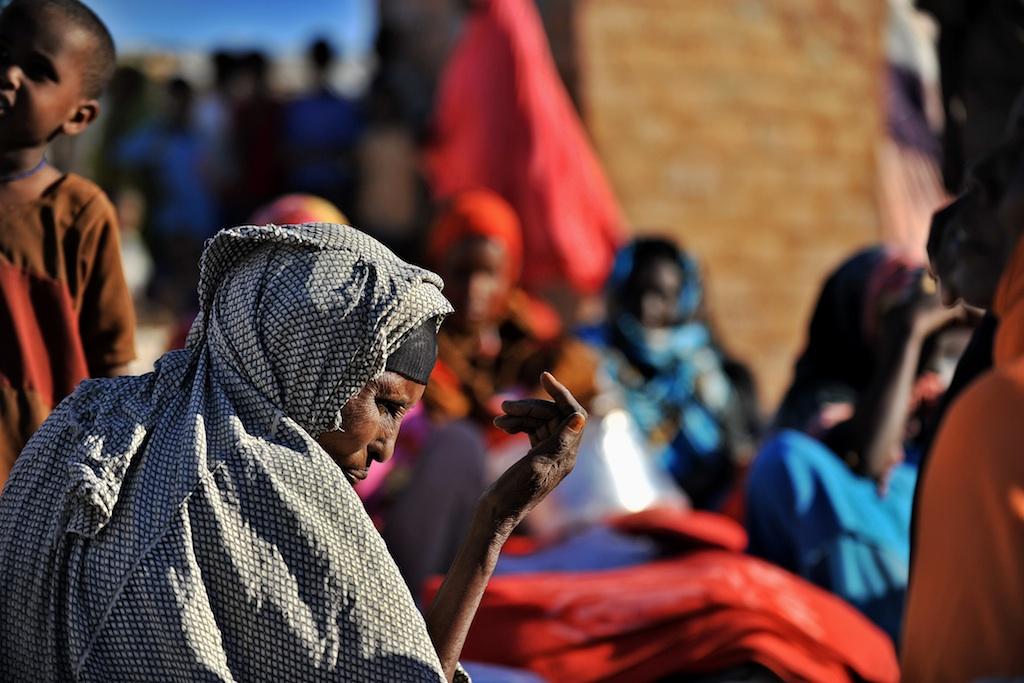Opinion: A lesson in stability from Somaliland
An elderly Somali sits in a camp for Internally Displaced People in Galkacyo, Somalia, during a visit by UN refugee agency chief Antonio Guterres on Dec. 3, 2010.
LEWIS CENTER, Ohio — Last month Al Shabaab, the Somali fundamentalist Islamist group with ties to Al Qaeda, claimed responsibility for a deadly truck bombing in Mogadishu in which more than 85 Somali students died as they waited in line to see if they had won scholarships to study in Turkey.
Somalia arguably is the world's most ungovernable country, and a graveyard for many of the United Nations' unsustainable policy initiatives.
But in reality Somalia is three different entities: Somaliland, Puntland and south central Somalia, where the current humanitarian disaster is unfolding.
Somaliland, the northern territory of Somalia, has shown itself to be a lawful and productive nation. Somaliland's order contrasts dramatically with the rest of Somalia, which has collapsed into clan-driven violence, terrorism, piracy and lawlessness.
The chronic instability in Somalia highlights that America and the West must find a new pragmatic approach which reflects the new reality on the ground.
Luckily, an overlooked partner for peace and stability already exists — Somaliland, which re-declared its independence in 1991. It was briefly independent in 1960.
More: UN declares famine in Somalia
Right now the United States is expending vast resources supporting a fictional Somali government led by Sheik Sharif Ahmed. While for political reasons, the Obama administration has refused to support and recognize a source of strength in the area — the stable, functioning and democratic entity of Somaliland, which stands for freedom and democracy.
I believe recognizing democratic Somaliland would have positive consequences not just for Somalia, but for the whole Horn of Africa region. It offers a platform to stabilize southern Somalia, a bulwark against radical forces in the region and a reliable partner to combat the piracy that is the scourge of the Gulf of Aden and the Indian ocean.
Somaliland’s success shows the world that Somalis have the ability to manage their own affairs, reconcile various clans, compromise and govern themselves, with little or no outside help.
Somaliland as an example that could provide the rest of southern Somalia’s rival clans an incentive to stop fighting among themselves in the interest of their own citizens, to reach out adversaries for the sake of ending the civil strife, and to begin moving toward good governance.
More: Aid workers kidnapped by Al Shabaab
If southern Somali clans used the Somaliland model, they could develop a more stable society, which would start to alleviate the heavy burden the Somali refugees had on its neighbors, especially Kenya, which is hosting more than 600,000 people who have fled the current famine and the violence in southern Somalia.
Granting full diplomatic recognition for Somaliland would help it rebuild its shattered economy. With a stable economy, Somaliland would become stronger and be able to provide more resources for education, health, agriculture, water and economic development, which would improve the livelihood of its people, especially for young people.
This would be bad news for Al Shabaab, which controls much of central and southern Somalia, because its Al Qaeda-style extremist ideology would diminish.
More deadly drone attacks or proxy African troops alone will not dismantle or defeat Al Shabaab in Somalia.
Somalia’s chronic instability is causing piracy to thrive in many small ports in its coastline, and is costing the world economy billions every year.
Puntland, a semi-autonomous region in eastern corner of Somalia, is the hub of the pirates that now plague much of the Gulf of Aden and the north Indian Ocean.
But Somaliland, which has a nascent coast guard that has cracked down on piracy on its 585 miles of coastline, is willing to contribute significantly with the United States and the West efforts to combat piracy in the Gulf of Aden — one of the busiest shipping lanes in the world.
If it were to become a member of the international community, Somaliland would be able to equip and modernize its counter-piracy operations and could become a reliable partner to the international community in eliminating piracy.
Recognizing Somaliland would not be the negative step some US State Department diplomats, particularly those who are experts on Africa, think it might be. I believe if America were to take the lead, many other countries would quickly follow.
It is time for President Barack Obama to lead the world and do the right thing by accepting the viable and sustainable solution — an independent and sovereign Somaliland.
Anything else would mean keeping the status-quo: more terrorism and chaos in Somalia, which could threaten the whole region. And for democratic Somaliland it would mean unjust delay for its diplomatic recognition and fewer resources to develop its economy. It would also leave the country to fend for itself from menacing piracy and extremism.
Ali Mohamed is co-founder of the Horn of Africa Freedom Foundation, a grass-roots level organization advocating for the advancement of freedom and democratic values for the indigenous people of the Horn of Africa.
Every day, reporters and producers at The World are hard at work bringing you human-centered news from across the globe. But we can’t do it without you. We need your support to ensure we can continue this work for another year.
Make a gift today, and you’ll help us unlock a matching gift of $67,000!
